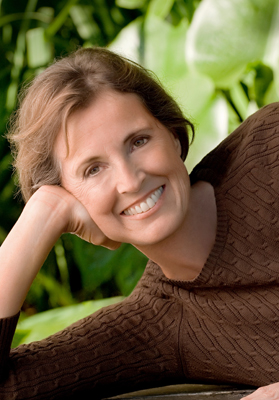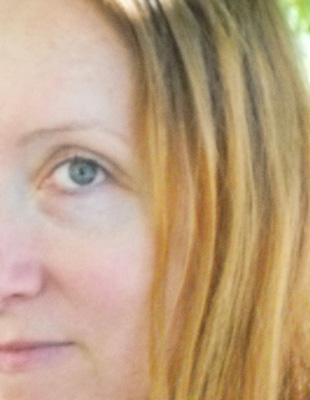Interviews
Where Being and Doing Merge: Kyeren Regehr in Conversation with Cynthia Woodman Kerkham
 Cynthia Woodman Kerkham talks with Malahat poetry board intern Kyeren Regehr about "Late Summer in Frederick Arm" (#174, Spring 2011), winner of The Malahat Review's 2011 Open Season Awards in the poetry category.
Cynthia Woodman Kerkham talks with Malahat poetry board intern Kyeren Regehr about "Late Summer in Frederick Arm" (#174, Spring 2011), winner of The Malahat Review's 2011 Open Season Awards in the poetry category.It was great to hear you read at Planet Earth Poetry, Cynthia. I’m eager to talk to you about your lovely glosa, “Late Summer in Frederick Arm,” and its lines of inspiration.
Did you find the D. H. Lawrence poem yet? I discovered it in Czeslaw Milosz's anthology A Book of Luminous Things. I decided to memorize some poems that summer and this was one of them. I love how it nails something so important to me—living with all the senses awake. That was the jumping-off point of the poem "Late Summer in Frederick Arm" as an exploration of being and doing and how being is a crucial form of doing! The poem was also sparked by an infestation of mice we suffered while tied to this dilapidated dock—a marvellous concatenation of events, something that often sparks my poems!
Ah-I knew "Mystic" was in one of my anthologies! What made you decide to memorize poems? And what was the movement of these events to the glosa form?
I wanted to memorize poems I loved as a way to get the rhythm under my skin, but I was drawn to Lawrence's poem, not for technical reasons like rhythm or language use but for its theme. A few times in my life I have expericed sinking into nature in such a way as to feel the separateness dissolve; in other words, I have submerged into a state of being rather than doing. "Mystic" talks to me about the glory of the state of being and of the importance of noticing -- where being and doing merge.
The form of the glosa seemed naturally to fit the content. I began with the form, in this poem, as a paean to Lawrence's poem. More often I begin with the content, and the form emerges, even with sonnets. Poetry is that state for me, whether I am writing it or enjoying someone else's work. The mice infestation came before writing the glosa. Many of my poems come from life. I experience something and I make a connection with other visions or ideas. That connection sparks the poem and then I discover more as I write; memories and other connections emerge.
The story of this poem's genesis is just that: the state of being for a week in a remote place where all I did was notice, came together with Lawrence's poem and the infestation of mice (they get on the boat by running up the lines used to tie to the dock, so we used tinfoil to block their entrance!), reminding me of the mouse, Frederick, a dreamer and his tribe's wordsmith, which contrasted in my mind to histories I have read of the busy doings of the British explorers up and down this coast in the time of Captain Vancouver, and the place name after a British hydrographer, Frederick John Owen Evans, replacing the names given by the people who had come before the British and Spanish, names that described the place. Underlying the poem is that split many of us feel in the wilderness -- how much do we live in concert with it, and how much do we interfere with it for our uses. Our battle with the mice was yet another example -- us or them. One is faced with this man/nature conflict all up and down this coastline with its logging gashes on the hillsides and its many fish farms in the bays. Nonetheless, when you have that magical expeierince of melting into the landscape, there is a brief reprieve from that dilemma -- and this poem came from that place. The poem is a tribute to place and to the person who respects and notices it "with all [her] senses awake."
What else awakens your senses ... who, for example, are your main poetic influences?
Rather than "influenced by" I like P. K. Page's notion of "affinity with." My degree was in Asian Studies and English, so I read Chinese and Japanese literature as well as the Romantics. I had an affinity with both. I love the spare imagery and sudden insights I've found in poets like Wang Wei and Li Po and the lushness in the Romantics and in Shakespeare's sonnets to which I often return. I remember hearing Al Purdy at UBC in the 70s, buying his book, and delighting in how he lifted the ordinary into the exalted with depth and humour. I taught English and ESL in a local high school, so I was studying how poems worked, but I was not serious about the study of modern poetry until I met Patrick Lane. His dictum at the Glenairley retreats was to read, read, read, so I did. One of my first loves during this period was Seamus Heaney, for his density of language. I discovered him in The Globe and Mail's "How Poems Work" section, which I am sorry to note has gone. And now the list is too long -- Rimbaud, Patrick Lane, Elizabeth Bishop, Tony Hoagland, Sharon Olds, Linda Gregg, Don Domansky, Patricia Young, and the poets of my Waywords writing group -- I keep so many poets around me and refer to them sometimes when I meet a problem in expression. I ask, how does one do that, page through a few books, and usually find an answer, ah, I could turn it into a question, for instance.
Reading this poem, and then recalling the poem you read -- "You Came Home" -- at the open mic at Planet Earth Poetry, I find myself wondering just how much of your work springs from personal experience?
It seems to me most poems are grounded in a real event, don't you think? Even if we are imagining something, it is connected to something real we have experienced, and that allows the reader to connect. For instance a poem I wrote from a painting was completely imagined, but the feeling imbuing the poem came from my experience with missing my son. I also write from dreams, not often of dreams, but in a dream state, that subconscious place brimming with metaphor. When my children were young, I bicycled off to "Dream Group" every Thursday night for five years, and with a teacher, we studied Jung and painted our dreams. I feel a strong connection between dream work and poetry -- the metaphor, the truths they can unearth, the hyper-reality of both. I still keep a dream notebook by my bed so I can capture a waking image or phrase. My routine on writing days is to talk to no one in the morning and go straight to my writing practice. This way I keep that fluid dream state, so that the heart is open and the real events transform into something more than themselves.
Can you speak about the choice to drop the traditional rhyme at line six in your glosa? Are you interested in pushing against the restrictions of forms such as this, and if so, are you looking for ways to bend them, or subvert the conventions?
It was a bit of a "damn the torpedos" attitude. Once I decide to write in a form, I usually try to stick to it, but there is always a dance between my intention and the formal rules. I like that tension. In this case, I went for my music over the music demanded by the form. I like the sonnet form, sometimes when I am moved to write a love poem (even though I don't know it is a love poem when I start!) or when a line comes to me in iambic pentameter, I find myself writing in the sonnet form, and I try to stick to it, but again, in that dance between the impulse and the rules of the form, your own music has to prevail. In pantoums, for example, I like how a few small words or the line's syntax can be slightly changed to make it fit with the construction of the preceding or following line. And in Bishop's "One Art" she plays with the strictness of the villanelle to great effect, changing some of her repeated lines, but keeping the essence of the form. The essence of the glosa, for me, is to pay homage to those four lines you've borrowed, and to take them to another place. It is very like the practice of Chinese traditional art -- you "copy" the master's words and tone, but you change them by putting your personal stamp on them.
Many contemporary poets are using traditional forms, breaking the rules, inventing new ones -- can you speak of synthesis between free-verse and formalism?
Absolutely, art is a living thing, language is a living thing, and we are lucky to have both free verse and traditional forms in our paint box. We will invent new forms, sometimes from breaking all the rules, sometimes from stretching the old ones. But the old ones remain, and there is great pleasure in sticking with the rules and letting them take you to new places, just as there is in breaking the rules. Getting back to the notion of tradition in Chinese art, if one chooses to work in a traditional form, I think one tries not to stray too far from the master. The changes must be subtle and for good poetic reasons while still keeping the heart of th eform.
I particularly enjoy how the demand of the form forces unusual word choices and unusual syntax because of a necessity of fitting into a pattern -- it is a good way to avoid cliche. Sometimes the meaning changes because of the form, and I also find that the form forces me to focus hard on what I am really saying. I may come up with a word that rhymes or has the right scansion, but then I have to ask: is it the perfect word to convey my intention? Often it is, or it takes me in an even more interesteing direction. All this can be frustrating and can choke the poetic impulse, but the more one does it, the more natural it becomes. And when it is working, it is like riding a roller coaster (as is free verse), my mind goes and I float.
The medium is the message, here, also -- the villanelle, for instance, is a great form for expressing the absence of narrative possibility and loss, the sestina a circular narrative, the pantoum echoes, and so on. I mostly write in free verse but I find that a familiarity with these forms affects my free verse positively, the song techniques found in formal poetry of repetition, rhyme, rhythm, circularity can show up in my free verse to beneficial effect, I believe -- more colours in the paint box.

Kyeren Regehr
* * * * * * * * *
Check out the guidelines for our 2012 Open Season Awards.









